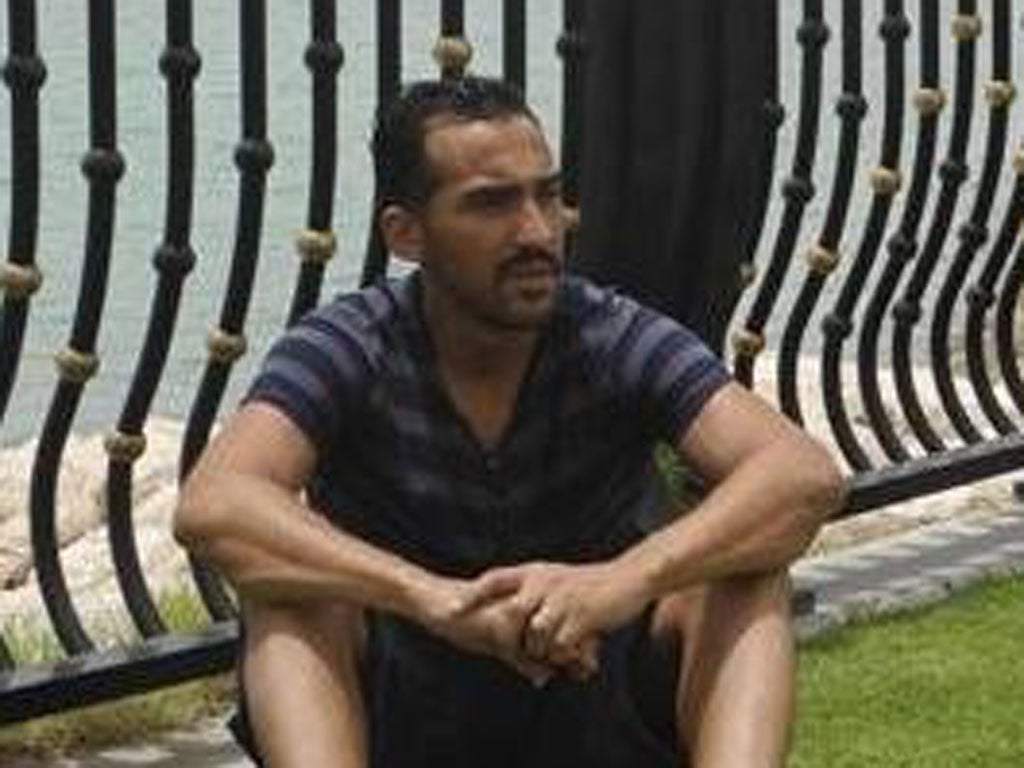Zahir Belounis: Trapped in Qatar, the player forced to plead for his family’s freedom
Owed two years’ wages, Zahir Belounis cannot leave World Cup hosts until he drops case

As Qatar defends itself against a wave of allegations over the mistreatment of Nepali immigrant workers, the hosts of the 2022 World Cup finals are now trying to resolve the extraordinary situation of the captive French professional footballer Zahir Belounis.
Belounis, who played for the El Jaish club, now in the country’s top flight, the Stars League, has a meeting this week with a high-ranking director close to the Qatar cabinet about his virtual captivity in the Gulf nation.
The 33-year-old has been told by Qatari authorities that he cannot leave the country unless he drops a legal case against El Jaish over what he claims are two years’ unpaid wages. The case gained such a high profile in France that the French President, François Hollande, tried, unsuccessfully, to intervene on Belounis’s behalf on a state visit to Qatar in June.
Belounis, who played professionally in France, Switzerland and Malaysia, took legal action against El Jaish in February after 18 months during which the club, affiliated to the military, had failed to pay him under the terms of a five-year contract he signed in 2010. He has been told that under the kafala system of visa sponsorship, blamed for the inhuman treatment of Nepali workers, he will not be allowed to leave the country unless he drops the case.
He was captain of the El Jaish team that was promoted from the second tier in 2011 and even became a Qatari citizen for two months in July that year to represent the country in the military world games in Brazil. When he returned he was loaned to second division team Al Markhiya, and the club stopped paying his wages.
Effectively trapped in Qatar, with his wife and two young daughters and little money left, Belounis told The Independent that his football career is over and that he has feared for his mental health in the past six months.
Belounis, who is a Muslim, said that every day that he spent in Qatar, punished for his decision to defend himself legally was “unacceptable”. He said: “I am the first to do this [take legal action against a Qatari club]. Of course I am scared. I am not in my country. Now that I have started to speak to the press some of my friends have left [ie broken contact].
“I have lost everything. Now I want to come back to my country. Give me my freedom. Here you can stop someone leaving if they have done something, made a mistake [ie, committed a crime]. I have nothing against me. Nothing, nothing, nothing.”
Belounis said that only since he had publicised his case has he seen a change in attitudes from the Qatari establishment and is hopeful that a meeting with a senior government official this week may be a breakthrough. However, he says that at times over the last six months he has contemplated suicide as he and his family have tried unsuccessfully to leave the country.
He said: “I touched my dream to be a professional footballer. We got to the first division and I was captain. Then it was like … ‘No, you’re nothing’. They stopped my football. The money I earned was for the future of my children. They killed me for nothing.”
He added: “Some times I have black thoughts. I am fighting alone against the system. I feel I want to kill myself. I don’t have a salary. I have two daughters and it is hard when they ask me to buy them a toy.”
Belounis is being supported by the International Trade Union Congress (ITUC), whose director Tim Noonan said that the allegation made by the now recalled Nepali ambassador to Qatar, Maya Kumari Sharma, that the country is an “open prison” for some holds true for Belounis. “He is unable to leave,” Noonan said. “It’s destroying his professional career and having a traumatic impact on his family.”
The ITUC laid out its concerns in person about working conditions in Qatar to Fifa’s general secretary, Jérôme Valcke, in November 2011. Fifa put out a short statement outlining the concerns but, the ITUC says, has done precious little since.
Last week’s revelations about the high mortality rate among Nepali workers on the Qatar Lusail City project have forced Fifa to take action and it has suggested the issue will be on the agenda for the executive committee’s meeting in Zurich on Thursday.
Belounis says he has been supported by the French embassy in Doha and has the help of a French lawyer, Frank Berton, who has a reputation for fighting cases of those in captivity outside France. Belounis said that he had had a 20-minute conversation with President Hollande in June.
“He was fantastic. He said to me: ‘Give us time and we will do something’. I said: ‘Mr President, I did nothing wrong’. He spoke about me [to Qatari authorities] but the thing did not move.”
Join our commenting forum
Join thought-provoking conversations, follow other Independent readers and see their replies
Comments